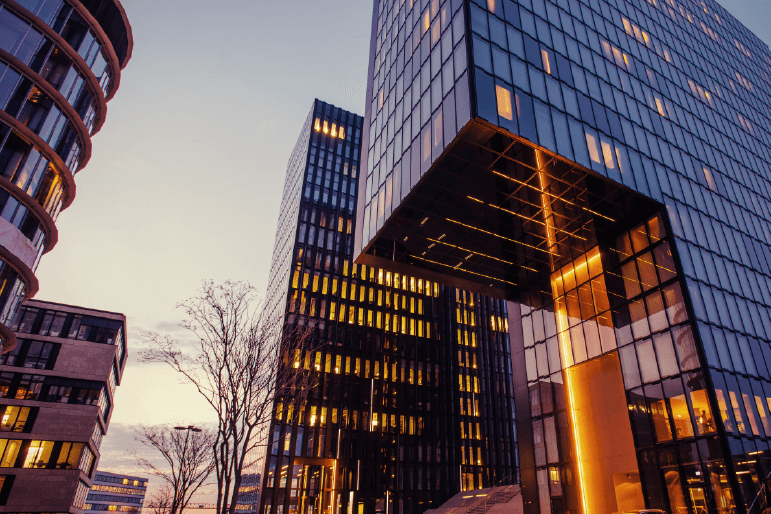
The Power of Smart Technology in Hotels: Outpacing the Competition
In popular cities where tourism is key, competition among the countless hotels is incredibly fierce. With hotels lining up next to each other on high traffic streets and selling within a similar price range, travelers are presented with an overwhelming number of options when searching for accommodation. It can be challenging to differentiate your hotel from the competition, and if you can’t tell your hotel apart, your customers won’t be able to either.
According to the latest Mastercard’s Global Destination Cities Index, Bangkok remains at the top of the charts as the No. 1 destination in terms of visitor volume and tourism spend, followed by Paris and London. And to cater to the overwhelming demand for accommodation, these cities also have an enormous supply of lodging options to match.
If your hotel is competing against strong contenders like those in top tourism cities, what strategies can you implement to surpass the competition?
How to differentiate your hotel from your competitors
When certain factors such as location and number of keys cannot be altered, here are some other areas you can prioritise to outperform your competitors:
Innovation: Innovate and incorporate new technologies within internal work processes as well as along the guest journey.
Memorable Service: Offer remarkable guest service and anticipate your guests’ needs.
Selective Focus: Narrow down on a specific target market and create marketing campaigns and activities for them.
Competitive Pricing: Offer good value through or charge a higher rate for an exclusive experience.
Unique Offering: Craft hotel experiences that stand out from the rest.
Powerful branding: Develop a strong brand presence in and out of the hotel by highlighting features and amenities that reinforce brand image.
Partnerships: Add value by curating localised experience packages with other local businesses Collaborate with local businesses for added value, such as offering packages including local experiences or sourcing local products.
Creating a Competitive Edge with Technology

Creating a Competitive Edge with Technology
The word “technology” has become commonplace in modern businesses, and it is no different for hospitality. Technology has the potential to make a significant difference in the way we live and how we do business.
By embracing technology and utilising it effectively to address your hotel’s challenges, you will be able to make meaningful impact in terms of streamlining operations, building brand loyalty, delivering more value to your guests, and achieving them all at reduced cost.
We will focus our discussion around innovation as a differentiator and will also cover quick and simple ways on how your hotel can start planning for them.
Guest Facing Hotel Innovations
In the wake of the pandemic, tourists have redefined their expectations of standard services at hotels. They now seek contactless means of reaching hotel associates, increased opportunities for self-service, and a greater number of digital interactions that would elevate their overall hotel experience.
Selecting the Right Tech for Guests
Technology is meant to work with you, not against you. Assess the impact of interactions to identify areas where technology can come in to streamline processes, freeing up your staff’s time to focus on more impactful and meaningful interactions.

Selecting the Right Tech for Guests
Technology is meant to work with you, not against you. Assess the impact of interactions to identify areas where technology can come in to streamline processes, freeing up your staff’s time to focus on more impactful and meaningful interactions.
While guest interactions are important, it is essential to prioritise connection opportunities and determine which interactions carry the most value. When selecting guest-facing technology for your hotel, it’s crucial to discern which areas to prioritise and which low-impact interactions require less attention.
One way to help in the decision process is to start by creating a list of guest interactions that typically occur during a stay. Once you have your list, rate each interaction on a scale from 1 to 5 according to its impact on the experience you would like to curate for your guests. For example, you may rate “building rapport with guests at breakfast” high, while “receiving a request for housekeeping items via phone” may be rated lower since guests are less likely to remember such interactions.
By assessing the impact of each interaction, you can identify areas where technology can streamline processes (the “1”s on your list), freeing up your staff’s time to focus on more important guest interactions (the “5”s). It is on the “5”s that you want to excel in because these interactions are the ones that guests are most likely to mention in their post stay TripAdvisor or Google reviews, and they can have a significant impact on a hotel’s reputation and future bookings.
By implementing guest-facing platforms and mobile applications, hotels can provide an additional channel for automating communications with their guests while they are at the property. Such technology allows guests to self-serve for common inquiries and hotel service requests, which reduces the reliance on staff to fulfill minor tasks. This not only frees up staff time for more complex requests but also improves the guest experience by providing a more convenient and efficient way to access hotel services.
Back-End Technologies are Just as Critical to Success

Back-End Technologies are Just as Critical to Success
While it’s true that guests can’t see the back-end operations of a hotel, neglecting back-end innovations can be a costly mistake. The traditional manual way of running a hotel of course still works, but a closer examination reveals numerous inefficiencies and errors that can arise from manual processes. It’s not about being fancy, but rather about embracing technology to not only save time and money but also improve the overall guest experience.
Apart from essentials such as Property Management System (PMS), Customer Relationship Management (CRM) and Point of Sale (POS) systems, one technology that is often overlooked is the Housekeeping Management System. Housekeeping Management Systems play a vital role in modern hotels to ensure efficient and effective housekeeping operations. With these systems, housekeeping managers can assign cleaning tasks, oversee the entire department’s activities, and communicate with staff in real-time.
By utilising real-time monitoring to track the cleaning status of each room, the hotel can receive accurate updates on which rooms have been cleaned and sanitised, providing an easy way to ensure a clean and comfortable environment for incoming guests. This not only improves guest satisfaction, but also helps to maintain high cleanliness standards throughout the hotel, which can lead to repeat business and positive word-of-mouth recommendations.
A bigger improvement to a housekeeping system would be to implement a full operations management solution that covers and streamlines all your operational tasks into a centralised system. A system like this will prove to be a game-changing tool for maximum productivity, especially when manpower is limited, and multitasking is necessary across different departments.
Inspire Change Through Leadership
“…the key driver of change must always come from the top, with leaders taking an active role in driving progress towards a more technologically advanced future.”

Inspire Change Through Leadership
“…the key driver of change must always come from the top, with leaders taking an active role in driving progress towards a more technologically advanced future.”
Now that you have successfully introduced technologies to differentiate your hotel from the competition, the work is done! Right? Not yet – you are just getting started. Ultimately, the key driver of change must always come from the top, with leaders taking an active role in driving progress towards a more technologically advanced future. Only by embodying the values of innovation and inspiring change, leaders can make a meaningful impact on the adoption of new innovations within their organisations.
Here are several ways that hotel leaders can articulate their support for technology adoption:
Communicate a clear and compelling vision for this change: Highlight the importance of technological innovation and its potential to drive growth and success. With clear communication, leaders can motivate their teams to make changes in their daily operations and further harness the power of technology tools.
Lead by example: Demonstrate your support for technology adoption by using new tools and processes in your day-to-day. This sends a powerful message to your teams, demonstrating that you are committed to staying ahead of the curve and embracing innovation.
Foster a culture of experimentation: Encourage your teams to experiment with new technologies and processes, creating a culture of innovation and continuous improvement. By embracing experimentation and risk-taking, hotels can stay agile and adapt quickly to changing market conditions.
Provide resources and support: Provide your teams with the resources and support they need to adopt new technologies effectively. This includes providing training and development opportunities, investing in new tools and systems, and creating a supportive environment that encourages learning and growth.
Celebrate successes: Recognise the efforts of your teams as they embrace new technologies and processes. By acknowledging and rewarding success, you can create a positive feedback loop that reinforces the importance of technology adoption and motivates further progress.
Ready to Improve Operations and Guest Satisfaction with Technology?
With Vouch, you can be up and running in no time at all.
We are already working with hotel groups like Accor, Hyatt and IHG, helping them optimise productivity and guest communications more effectively. Book a demo now and have one of our consultants guide you through the most effective solutions for the challenges faced by modern hotels.

The Power of Smart Technology in Hotels: Outpacing the Competition
In popular cities where tourism is key, competition among the countless hotels is incredibly fierce. With hotels lining up next to each other on high traffic streets and selling within a similar price range, travelers are presented with an overwhelming number of options when searching for accommodation. It can be challenging to differentiate your hotel from the competition, and if you can’t tell your hotel apart, your customers won’t be able to either.
According to the latest Mastercard’s Global Destination Cities Index, Bangkok remains at the top of the charts as the No. 1 destination in terms of visitor volume and tourism spend, followed by Paris and London. And to cater to the overwhelming demand for accommodation, these cities also have an enormous supply of lodging options to match.
If your hotel is competing against strong contenders like those in top tourism cities, what strategies can you implement to surpass the competition?
How to differentiate your hotel from your competitors
When certain factors such as location and number of keys cannot be altered, here are some other areas you can prioritise to outperform your competitors:
Innovation: Innovate and incorporate new technologies within internal work processes as well as along the guest journey.
Memorable Service: Offer remarkable guest service and anticipate your guests’ needs.
Selective Focus: Narrow down on a specific target market and create marketing campaigns and activities for them.
Competitive Pricing: Offer good value through or charge a higher rate for an exclusive experience.
Unique Offering: Craft hotel experiences that stand out from the rest.
Powerful branding: Develop a strong brand presence in and out of the hotel by highlighting features and amenities that reinforce brand image.
Partnerships: Add value by curating localised experience packages with other local businesses Collaborate with local businesses for added value, such as offering packages including local experiences or sourcing local products.

Creating a Competitive Edge with Technology
The word “technology” has become commonplace in modern businesses, and it is no different for hospitality. Technology has the potential to make a significant difference in the way we live and how we do business.
By embracing technology and utilising it effectively to address your hotel’s challenges, you will be able to make meaningful impact in terms of streamlining operations, building brand loyalty, delivering more value to your guests, and achieving them all at reduced cost.
We will focus our discussion around innovation as a differentiator and will also cover quick and simple ways on how your hotel can start planning for them.
Guest Facing Hotel Innovations
In the wake of the pandemic, tourists have redefined their expectations of standard services at hotels. They now seek contactless means of reaching hotel associates, increased opportunities for self-service, and a greater number of digital interactions that would elevate their overall hotel experience.

Selecting the Right Tech for Guests
Technology is meant to work with you, not against you. Assess the impact of interactions to identify areas where technology can come in to streamline processes, freeing up your staff’s time to focus on more impactful and meaningful interactions.
While guest interactions are important, it is essential to prioritise connection opportunities and determine which interactions carry the most value. When selecting guest-facing technology for your hotel, it’s crucial to discern which areas to prioritise and which low-impact interactions require less attention.
One way to help in the decision process is to start by creating a list of guest interactions that typically occur during a stay. Once you have your list, rate each interaction on a scale from 1 to 5 according to its impact on the experience you would like to curate for your guests. For example, you may rate “building rapport with guests at breakfast” high, while “receiving a request for housekeeping items via phone” may be rated lower since guests are less likely to remember such interactions.
By assessing the impact of each interaction, you can identify areas where technology can streamline processes (the “1”s on your list), freeing up your staff’s time to focus on more important guest interactions (the “5”s). It is on the “5”s that you want to excel in because these interactions are the ones that guests are most likely to mention in their post stay TripAdvisor or Google reviews, and they can have a significant impact on a hotel’s reputation and future bookings.
By implementing guest-facing platforms and mobile applications, hotels can provide an additional channel for automating communications with their guests while they are at the property. Such technology allows guests to self-serve for common inquiries and hotel service requests, which reduces the reliance on staff to fulfill minor tasks. This not only frees up staff time for more complex requests but also improves the guest experience by providing a more convenient and efficient way to access hotel services.

Back-End Technologies are Just as Critical to Success
While it’s true that guests can’t see the back-end operations of a hotel, neglecting back-end innovations can be a costly mistake. The traditional manual way of running a hotel of course still works, but a closer examination reveals numerous inefficiencies and errors that can arise from manual processes. It’s not about being fancy, but rather about embracing technology to not only save time and money but also improve the overall guest experience.
Apart from essentials such as Property Management System (PMS), Customer Relationship Management (CRM) and Point of Sale (POS) systems, one technology that is often overlooked is the Housekeeping Management System. Housekeeping Management Systems play a vital role in modern hotels to ensure efficient and effective housekeeping operations. With these systems, housekeeping managers can assign cleaning tasks, oversee the entire department’s activities, and communicate with staff in real-time.
By utilising real-time monitoring to track the cleaning status of each room, the hotel can receive accurate updates on which rooms have been cleaned and sanitised, providing an easy way to ensure a clean and comfortable environment for incoming guests. This not only improves guest satisfaction, but also helps to maintain high cleanliness standards throughout the hotel, which can lead to repeat business and positive word-of-mouth recommendations.
A bigger improvement to a housekeeping system would be to implement a full operations management solution that covers and streamlines all your operational tasks into a centralised system. A system like this will prove to be a game-changing tool for maximum productivity, especially when manpower is limited, and multitasking is necessary across different departments.

Inspire Change Through Leadership
“…the key driver of change must always come from the top, with leaders taking an active role in driving progress towards a more technologically advanced future.”
Now that you have successfully introduced technologies to differentiate your hotel from the competition, the work is done! Right? Not yet – you are just getting started. Ultimately, the key driver of change must always come from the top, with leaders taking an active role in driving progress towards a more technologically advanced future. Only by embodying the values of innovation and inspiring change, leaders can make a meaningful impact on the adoption of new innovations within their organisations.
Here are several ways that hotel leaders can articulate their support for technology adoption:
Communicate a clear and compelling vision for this change: Highlight the importance of technological innovation and its potential to drive growth and success. With clear communication, leaders can motivate their teams to make changes in their daily operations and further harness the power of technology tools.
Lead by example: Demonstrate your support for technology adoption by using new tools and processes in your day-to-day. This sends a powerful message to your teams, demonstrating that you are committed to staying ahead of the curve and embracing innovation.
Foster a culture of experimentation: Encourage your teams to experiment with new technologies and processes, creating a culture of innovation and continuous improvement. By embracing experimentation and risk-taking, hotels can stay agile and adapt quickly to changing market conditions.
Provide resources and support: Provide your teams with the resources and support they need to adopt new technologies effectively. This includes providing training and development opportunities, investing in new tools and systems, and creating a supportive environment that encourages learning and growth.
Celebrate successes: Recognise the efforts of your teams as they embrace new technologies and processes. By acknowledging and rewarding success, you can create a positive feedback loop that reinforces the importance of technology adoption and motivates further progress.
Ready to Improve Operations and Guest Satisfaction with Technology?
With Vouch, you can be up and running in no time at all.
We are already working with hotel groups like Accor, Hyatt and IHG, helping them optimise productivity and guest communications more effectively. Book a demo now and have one of our consultants guide you through the most effective solutions for the challenges faced by modern hotels.
